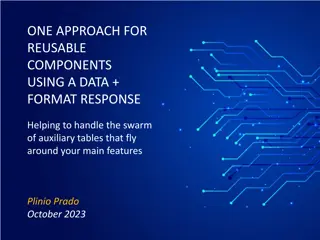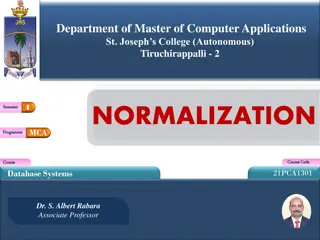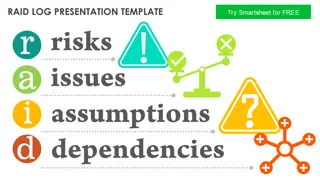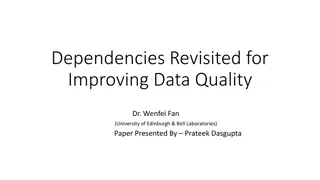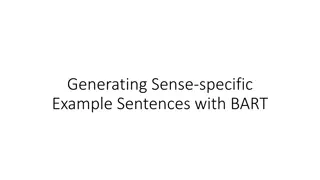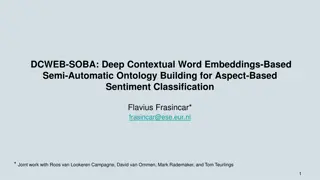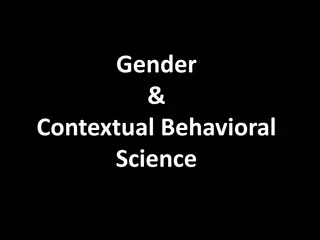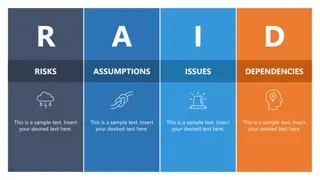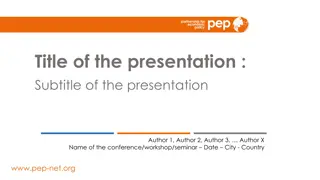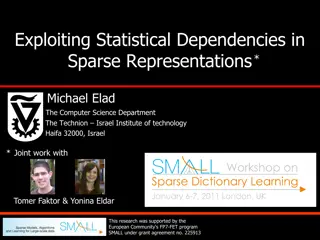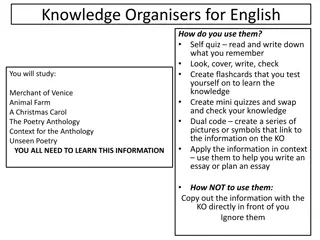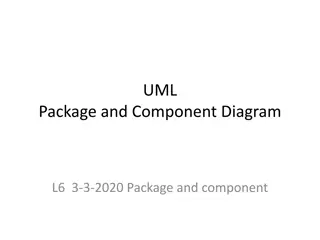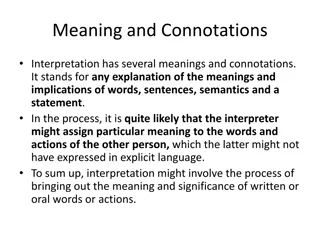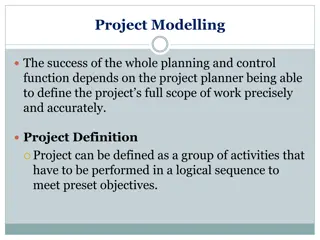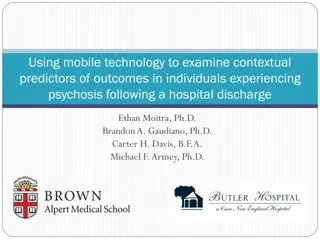Government Printing Works Ministerial Review Panel Progress Report Presentation
This presentation outlines the progress report on the Government Printing Works' implementation of the Ministerial Review Panel recommendations to the Portfolio Committee on Home Affairs. It covers the background of the incident in February 2021, challenges identified, overall progress, progress per
0 views • 49 slides
Handling Auxiliary Tables in Reusable Components
Approach for managing auxiliary tables efficiently within main features using a data format response. Presentation details Plinio Prado's exploration of different alternatives and his experience in transitioning front-end to TypeScript after the project. The talk emphasizes making informed choices o
0 views • 22 slides
Cross-platform C++ Development with CMake and vcpkg
Explore the process of creating cross-platform C++ projects using CMake and vcpkg. Learn about the motivation behind build and meta-build systems, the usage of CMake for project configuration, the significance of cross-platform dependency managers like vcpkg, and how to integrate CMake with vcpkg fo
7 views • 36 slides
Understanding Input-Output Models in Economics
Input-Output models, pioneered by Wassily Leontief, depict inter-industry relationships within an economy. These models analyze the dependencies between different sectors and have been utilized for studying agricultural production distribution, economic development planning, and impact analysis of i
8 views • 7 slides
Problem Definition Sheet (PDS) Guidance and Template Overview
Providing guidance on utilizing the Problem Definition Sheet (PDS) for project clarity and success. The template outlines key questions, stakeholders, desired outputs, scope, timings, context, constraints, and risks. It emphasizes addressing a specific question, engaging relevant stakeholders, setti
5 views • 4 slides
Understanding Contextual Factors in Curriculum Development
This chapter delves into the significance of internal and external contextual factors in shaping curriculum development. It discusses the process of gathering essential contextual data, identifying relevant sources, and integrating data to create an evidence-informed, context-relevant, unified curri
5 views • 31 slides
Localised Adaptive Spatial-Temporal Graph Neural Network
This paper introduces the Localised Adaptive Spatial-Temporal Graph Neural Network model, focusing on the importance of spatial-temporal data modeling in graph structures. The challenges of balancing spatial and temporal dependencies for accurate inference are addressed, along with the use of distri
3 views • 19 slides
UAP CONFERENCE AT KAMPALA
The UAP Conference at Kampala focused on the challenges, opportunities, and recommendations for regulating alcohol consumption at all levels. The presentation highlighted issues such as cultural norms, health impacts, economic consequences, and societal behaviors associated with alcohol. Challenges
0 views • 22 slides
Understanding Ecosystems: Ecological Interactions and Dependencies
Ecology is the study of how organisms interact with their environment, influencing their distribution and abundance. This exploration covers terrestrial and aquatic biomes, energy flow, environmental impacts, adaptations, and global ecosystems, emphasizing the interconnectedness of all living organi
2 views • 58 slides
Guide to Self-built Moodle Docker Testing Environments by Alexander Dominicus
Dive into the world of self-built Moodle Docker testing environments with insights shared by Alexander Dominicus. Understand the significance of Docker containers in ensuring software portability, encapsulating dependencies, and resolving bugs. Explore the choice between pre-built and self-built set
2 views • 24 slides
Effective Pre-Teaching Vocabulary Strategies for ELs
ELs benefit from specific pre-teaching vocabulary strategies such as selecting important words, providing contextual understanding, offering student-friendly definitions, and engaging in oral interactions. Massachusetts Department of Elementary and Secondary Education emphasizes the importance of ch
1 views • 7 slides
Leveraging Artifact Dependency Graphs for Software Vulnerability Detection
Explore how LLVM-GitBOM utilizes artifact dependency graphs to detect vulnerabilities in software dependencies. The presentation covers the overview of GitBOM, CVE detection, supply chain vulnerabilities, and the importance of precise build tools in vulnerability scanning. Learn about utilizing gito
0 views • 34 slides
Understanding Contextual Safeguarding in Multi-Agency Working
This workshop aims to assist multi-agency practitioners in developing Contextual Safeguarding approaches through team activities and discussions. The session covers partnership working outside the home, the ecological approach of Contextual Safeguarding, and an exercise on creating safety in various
0 views • 26 slides
Understanding Makefiles in Intermediate Programming
Makefiles are essential for automating the build process in programming projects by defining rules for building target files based on dependencies. By organizing commands and dependencies in a structured manner, Makefiles simplify the build process, reduce errors, and save time. This article covers
0 views • 18 slides
Understanding Database Normalization and Functional Dependencies
Database normalization is a crucial process that aims to improve database design by organizing data into higher forms of normality. This helps in reducing redundancy and ensuring data integrity. Functional dependencies play a key role in defining relationships between attributes in a database. By un
0 views • 33 slides
Understanding Discourse Analysis: Formal Links and Contextual Connections
Discourse analysis involves examining language beyond grammar rules, focusing on formal links within sentences and contextual connections outside of language. Guy Cook discusses how formal features shape discourse meaning and how verb forms influence sentence coherence. The use of parallelism in spe
2 views • 22 slides
Comprehensive RAID Log Presentation and Management Overview
This comprehensive presentation template provides a detailed overview of a RAID log, including risks, issues, threats, assumptions, dependencies, and reliance factors. It offers insights on tracking and managing different aspects of project planning and execution, categorized by risk levels. The bre
0 views • 6 slides
Understanding Political Theory through a Contextual Approach
Exploring G.H. Sabine's perspective on political theory through a contextual approach, emphasizing the importance of historical context and societal influences. Sabine argues that while political theory evolves with its contemporary politics, it should be analyzed within its specific time and social
0 views • 9 slides
Insights from WJEC A Level English Literature Examiners' Report
Examiners noted candidates' strengths and weaknesses in analyzing poetry pre-1900 and unseen poetry. Candidates lacked confidence in discussing form and contextual influences, but some effectively integrated these aspects. Responses to individual poems were detailed, with contextual focus crucial in
3 views • 18 slides
Exploring Contextual Ideas in Frankenstein by Mary Shelley
An analysis of contextual ideas related to the study of Frankenstein by Mary Shelley. Delve into the key connotations, connections with other literary texts, and the enduring resonance of a novel written almost 200 years ago. Understand the significance of the contexts in which literary texts are wr
0 views • 57 slides
Understanding the Impact of Dirty Data on Quality Improvement
Real-world data often contains errors and inconsistencies, leading to significant costs for businesses. Research activities focus on error correction, object identification, profiling, and data integration to enhance data quality. A principled approach based on data dependencies offers a promising s
0 views • 53 slides
Exploring the Similarities Between Goldiamond's Work and CBS Approaches
Israel Goldiamond's work in professional development, ethics, and behavior analysis shows similarities with CBS approaches, emphasizing contextual factors, functional analyses, and long-term goals. Both approaches focus on understanding behavior within its context and promoting positive change throu
3 views • 5 slides
Motivating Patients on Smoking Cessation: A Contextual Approach Overview
Explore behavioral interventions for smoking cessation, gain insights into effective brief interventions, and learn to apply them using real-world examples. Understand the challenges in tobacco management in primary care and discover common strategies to support patients in quitting smoking. Embrace
0 views • 19 slides
Generating Sense-specific Example Sentences with BART Approach
This work focuses on generating sense-specific example sentences using BART (Bidirectional and AutoRegressive Transformers) by conditioning on the target word and its contextual representation from another sentence with the desired sense. The approach involves two components: a contextual word encod
0 views • 19 slides
Semi-Automatic Ontology Building for Aspect-Based Sentiment Classification
Growing importance of online reviews highlights the need for automation in sentiment mining. Aspect-Based Sentiment Analysis (ABSA) focuses on detecting sentiments expressed in product reviews, with a specific emphasis on sentence-level analysis. The proposed approach, Deep Contextual Word Embedding
0 views • 34 slides
Understanding Gender and Behavioral Science
Exploring the nuances of gender, this content delves into the variance among genders, the impact of gender on behavior, and societal issues related to gender discrimination. It challenges the binary view of gender and highlights the performative spectrum influenced by culture, language, biology, and
0 views • 18 slides
Comprehensive RAID Log Presentation Template
This comprehensive presentation template includes a RAID log with risks, assumptions, issues, and dependencies structured in a professional layout. Utilize this template to effectively manage project risks and dependencies. The template also features a simple RAID log slide template for a clear over
0 views • 7 slides
Policy Implications of Research on Contextual Factors Affecting Urban Development
Explore the impact of contextual factors on urban development, presenting research findings, policy implications, and recommendations. The presentation covers motivations, research questions, methodology, data analysis, and key findings to aid policymakers in enhancing urban planning strategies.
0 views • 12 slides
Understanding Data Dependencies in Nested Loops
Studying data dependencies in nested loops is crucial for optimizing code performance. The analysis involves assessing dependencies across loop iterations, iteration numbers, iteration vectors, and loop nests. Dependencies in loop nests are determined by iteration vectors, memory accesses, and write
0 views • 15 slides
Statistical Dependencies in Sparse Representations: Exploitation & Applications
Explore how to exploit statistical dependencies in sparse representations through joint work by Michael Elad, Tomer Faktor, and Yonina Eldar. The research delves into practical pursuit algorithms using the Boltzmann Machine, highlighting motivations, basics, and practical steps for adaptive recovery
0 views • 47 slides
Study Guide for "Merchant of Venice" - Key Contextual Information and Analysis Points
Explore the key moments and contextual information of "Merchant of Venice" to enhance your understanding of the play. Delve into themes such as patriarchy, money lending, anti-Semitism, and more. Learn about the significant characters and events, along with analysis points to enrich your interpretat
0 views • 12 slides
Understanding UML Package Diagrams and Components in Software Design
UML package diagrams are essential in organizing model elements such as use cases and classes into groups for a better structure in system modeling. They help in providing a high-level overview of requirements and architecture, logically modularizing complex diagrams, and indicating dependencies bet
0 views • 38 slides
Unveiling the Art of Interpretation: From Textual Meanings to Contextual Significance
Interpretation delves into the meanings and implications of words, sentences, and classical texts, bringing out their significance. It involves decoding complex ideas, separating temporal and perennial thoughts, and revealing contemporary relevance. Different approaches like textual and contextual a
0 views • 18 slides
Techniques for Passage Comprehension
Techniques such as understanding, summarizing, and contextual analysis are essential for effective passage comprehension. In your own words, summarizing key points, and deciphering contextual questions play a vital role in grasping the content fully. By utilizing these methods, you can enhance your
0 views • 46 slides
Exploring Project Modelling and Work Breakdown Structures
In project management, precise project definition is crucial for successful planning and control. Project modelling involves utilizing tools like Work Breakdown Structure (WBS) to efficiently define project scopes and hierarchies. By breaking down the project into smaller elements of work, WBS aids
0 views • 37 slides
Understanding Vanilla Universe Checkpointing and Its Challenges
Vanilla universe checkpointing involves saving sufficient state information to allow restarting execution without losing previous work. However, this process is challenging due to contextual dependencies in the state of processes, leading to complexities in managing checkpoints effectively.
0 views • 16 slides
Contextual GAN for Image Generation from Sketch Constraint
Utilizing contextual GAN, this project aims to automatically generate photographic images from hand-sketched objects. It addresses the challenge of aligning output with free-hand sketches while offering advantages like a unified network for sketch-image understanding. The process involves posing ima
0 views • 21 slides
Contextual Predictors of Psychosis Outcomes Post-Hospital Discharge
This study explores predictors of outcomes in individuals with psychosis post-hospital discharge using mobile technology. It addresses treatment nonadherence, the impact of antipsychotics, psychological flexibility, and the use of ecological momentary assessment (EMA). The research highlights the cr
0 views • 27 slides
Loop Invariant Code Motion in Frequent Paths for Optimization
Loop Invariant Code Motion (LICM) is a key optimization technique that identifies and moves code operations whose operands remain constant within a loop to improve performance. The process involves careful consideration of memory operations and operations not executed every iteration. The assignment
0 views • 20 slides
Conditional on the Environment? The Contextual Embeddedness of Age, Health, and Socioeconomic Status as Predictors of Remote Work among Older Europeans through the COVID-19 Pandemic
This study delves into how the COVID-19 pandemic has influenced remote work patterns among older Europeans, focusing on the interaction between age, health, socioeconomic status, and contextual factors. It explores the impact of government restrictions, education, income, age, and health on the abil
0 views • 24 slides

